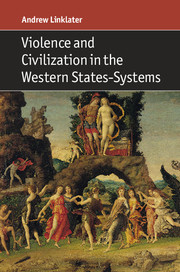Book contents
- Frontmatter
- Epigraph
- Contents
- Preface and Acknowledgements
- Introduction
- 1 The Hellenic City-States System
- 2 New Territorial Concentrations of Power in Antiquity
- 3 The International Relations of Latin Christendom
- 4 The Renaissance City-State System
- 5 The European States-System and the Idea of Civilization
- 6 Cruelty and Compassion in the Age of Empire
- 7 Enlightenment Thought and Global Civilization
- 8 Total Warfare and Decivilizing Processes
- 9 Modernity, Civilization and the Holocaust
- 10 Sovereignty, Citizenship and Humanity in the Global Civilizing Process
- 11 Process Sociology, Civilization and International Society
- Conclusion
- Bibliography
- Index
1 - The Hellenic City-States System
Published online by Cambridge University Press: 28 March 2017
- Frontmatter
- Epigraph
- Contents
- Preface and Acknowledgements
- Introduction
- 1 The Hellenic City-States System
- 2 New Territorial Concentrations of Power in Antiquity
- 3 The International Relations of Latin Christendom
- 4 The Renaissance City-State System
- 5 The European States-System and the Idea of Civilization
- 6 Cruelty and Compassion in the Age of Empire
- 7 Enlightenment Thought and Global Civilization
- 8 Total Warfare and Decivilizing Processes
- 9 Modernity, Civilization and the Holocaust
- 10 Sovereignty, Citizenship and Humanity in the Global Civilizing Process
- 11 Process Sociology, Civilization and International Society
- Conclusion
- Bibliography
- Index
Summary
The Ancient Greeks … who are so often held up to us as models of civilized behaviour, considered it quite a matter of course to commit acts of mass destruction, not quite identical to those of the National Socialists but, nevertheless, similar to them in certain respects. The Athenian popular assembly decided to wipe out the entire population of Melos, because the city did not want to join the Athenian colonial empire. There were dozens of other examples in antiquity of what we now call genocide. The difference between this and the attempted genocide in the 1930s and 1940s is at first glance not easy to grasp. Nevertheless, it is quite clear. In the period of Greek antiquity, this warlike behaviour was considered normal. It conformed to the standard.
(Elias 2013: 445–6)The contrasts that Elias drew between ancient and modern warfare must be treated with considerable caution. His observations about the greater tolerance of genocide in classical Greece and Rome captured certain features of the wars between Athens and Sparta, but serious doubts must be raised about whether they provided an accurate summation of the main patterns of development across the whole history of the Hellenic city-states system. The comments about genocide seem to imply that international relations in ancient Greece were remarkably static: an interpretation that is supported in some but not all quarters (see the contrasting views of van Wees 2004; Connor 1988; and Low 2007). If those who reject the interpretation that ‘total war’ was endemic are correct, then, paradoxically, Elias's comments were at odds with his processual standpoint – with a long-term perspective on social interaction that analysed recurring geopolitical competition and war in conjunction with shifting relations between civilizing and decivilizing processes or integrative and disintegrative tendencies.
Elias's remarks on ancient and modern attitudes to genocide certainly stressed that social attitudes to violence had changed over time. Commenting on the pankration – literally, ‘total force’ or ‘no holds barred’, or a form of ground wrestling in which participants were not infrequently killed – Elias (2008b: 117–18) speculated that the ‘standards of violence in fighting may have fluctuated’ over the thousand year period in which the Olympic Games were held.
- Type
- Chapter
- Information
- Violence and Civilization in the Western States-Systems , pp. 23 - 57Publisher: Cambridge University PressPrint publication year: 2017

